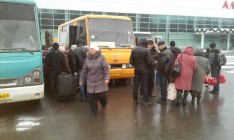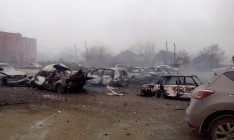Politics
hot spotThe law on the special status of the Donbas will not be enforced earlier than this winter

The absence of mechanisms and legislative norms prevents enforcement of the provisions of the Law On Special Procedures of Local Self-administration in the Donbas Region, regardless of whether or not the law takes effect. While the parliament of Ukraine of the new convocation will have to resolve this issue, many of the provisions of the law require amendments to the Constitution, which could be delayed until the spring of 2015.
Framework law
Vice Speaker of the Verkhovna Rada Ruslan Koshulynskiy told Capital that the Law On Special Procedures of Local Self-administration in Separate Regions of the Donbas and Luhansk Oblasts has not been enforced, notwithstanding the fact that it took legal effect on October 18. “This law cannot be enforced as the mechanisms for this are not in place,” said Koshulynskiy.
People’s deputy and advisor to the president Oleksandr Dombrovskiy (independent) explained to Capital that the law is a framework document. According to his assessments, in order for the law to be enforced more than ten normative documents of the Verkhovna Rada and the government must be itemized in detail. “The document was quickly adopted as there was a need to seek ways of stabilizing the situation in the Donbas region and in such situations there is no guarantee that this would work 100%. We need truce and that the Constitution of Ukraine and its laws have their effect on this territory,” says Dombrovskiy.
Koshulynskiy said today there are no norms in the legislation that regulate the appointment of prosecutors and judges as representatives of the local self-government and establishing local law enforcement bodies that would ensure the effectiveness of the law on the special status of the Donbas region. For this law to be adopted, amendments to the Constitution are imperative.
“The new Verkhovna Rada will work on these issues next month. As soon as a constitutional majority is voted in, amendments to the Constitution will be submitted in order to run in the elections to local councils with new powers,” says Koshulynskiy.
Vice Chair of the Committee on Issues of State-building and Local Self-government Natalia Novak (UDAR) said certain provisions in the law will have legislative mechanisms no sooner than February 2015.
As a reminder, the law on the special status of the Donbas region was voted in on September 16 at a closed session of the VR. President Petro Poroshenko actively participated in adoption of the law having convinced the leaders of factions and deputies to support the document.
Aside from amnesty for participants of the armed conflict in the ATO zone, the law envisages the holding of snap local elections on December 7. The new representatives of the ruling power will be granted the right to independently appoint judges and prosecutors and create a local citizens’ police force. The special status of the Russian language is fixed on territories in which the law is in effect. People’s deputies should determine the districts to which the effect of the law limited for three years applies.
A fine line
Vice Chair of the Committee on Issues of State-building and Local Self-government Oleh Paraskiv (member of the For Peace and Stability party) believes the law will take effect after the delimitation of the 30-km safety zone and full cease fire. “The law was passed in order to show international partners and, first and foremost, the Donbas region our readiness to grant it greater independence,” he told Capital.
However, so far talks on creating the buffer zone, which have been ongoing for nearly a month, have not produced any results. Moreover, the absence of agreements has prevented the Verkhovna Rada from determining the regions to which the effect of the law will apply. “For this deputies must be issued all necessary materials and maps of the border zone from the high command of the ATO or the leadership of the National Security and Defense Council,” says Koshulynskiy. Members of the Central Election Commission were the only ones to fulfill the law after it came into effect.
Vice Chairman of the CEC Andriy Mahera informed Capital about its readiness to hold elections on December 7, but only after the populated regions and the allocation of the required financing is determined. “Everything depends on the timeliness of the parliament. If it announces elections at the start of November, then we will meet the requirements of the law stipulating the 50 days of the election process,” he said.
Despite this, yesterday the authorized representative of the president on settlement of the conflict in the Donbas region Iryna Herashchenko said the date of the elections to local councils in the Donbas region may be deferred.






 of the agreement of syndication with Financial Times Limited are strictly prohibited. Use of materials which refers to France-Presse, Reuters, Interfax-Ukraine, Ukrainian News, UNIAN agencies is strictly prohibited. Materials marked
of the agreement of syndication with Financial Times Limited are strictly prohibited. Use of materials which refers to France-Presse, Reuters, Interfax-Ukraine, Ukrainian News, UNIAN agencies is strictly prohibited. Materials marked  are published as advertisements.
are published as advertisements.